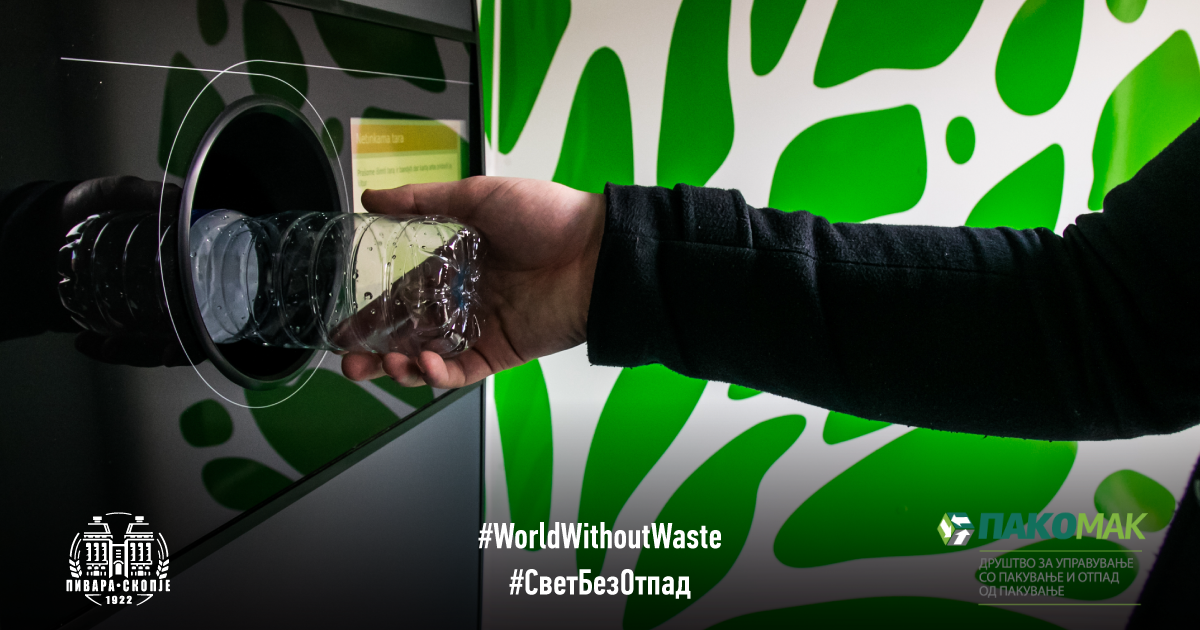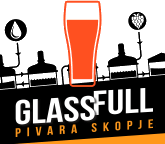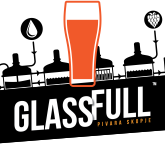
PAKOMAK INTRODUCES THE LAST GLOBAL TREND IN RECYCLING – REVERSE VENDING MACHINES FOR PLASTIC BOTTLES AND CANS

The enormous volume of waste being generated by the increased consumption in our modern society, the selective disposal, and collection and recycling of waste is an extremely important process for maintaining clean environment and protecting it against pollution.
However, many people still believe that the process is complicated and energy-consuming, and therefore, Pakomak will try to motivate the citizens of Macedonia to get involved in a simple manner, more precisely, through the introduction of reverse vending machines called SmartBin that are to operate within ecoMac – a stimulation system awarding award, discounts or other benefits to people selecting and disposing their waste. So far, we have not had a project of this type on the territory of Macedonia, and this is a true innovation in the field of municipal waste collection and recycling.
What is the idea behind the introduction of Reverse Vending Machines (RVM)?
The objective is to motivate citizens to embrace the process of selective waste disposal efficiently and promptly and to be properly rewarded for taking part into the process by awarding them so-called “green points” to be used when paying for products and public services (e.g. utility taxes, public transportation fares, parking etc.). To begin, Pakomak is planning to install RVMs in several municipalities in the country, while the long-term plan consists of introducing RVMs everywhere in Macedonia. The project is intended for all citizens, regardless of the age and social status, and the awarding system is properly adjusted to all groups in society. The first prototype is expected to be installed very soon.
How do Pakomak RVMs actually work?
Although the RVMs operate just as any other standard vending machine (money is inserted, product is delivered), due to the reverse process (product is inserted, money is delivered), they are called “reverse vending machines“. What started as an experiment back in the 1970s in Norway, today is a very successful global project which helps keep our planet much cleaner simply and conveniently, at the same time, it encourages people to recycle their waste.
Although this is the first time these machines are introduced in Macedonia, reverse vending machines are certainly not a new concept globally. Usually, older RVMs employ a very simple concept: users/citizens insert recyclable waste (plastic bottles, cans, glass bottles) into the machine, and in return, they get coupon of certain value or cash.
Pakomak’s RVMs are designed to deposit plastic bottles and cans, which are then compacted and stored. Via a special mobile app, citizens disposing their waste using Pakomak RVMs will be awarded “green points” to use when paying for public services or products in the retail network. Pakomak’s business model will also include network consisting of public institutions, municipalities, production companies recycling waste and it will also produce reliable data on the volume of packaging material waste, as well as the brand and the material of such packaging material.
In addition, Pakomak’s system will be able to identify those citizens who are the most eco-conscious and recycle the highest number of bottles during the year, thus giving them possibility to win additional benefits.
What sets apart Pakomak’s system and the other systems introduced in other countries?
In the countries of the West, these so-called deposit systems are introduced across the entire territory of the country and result in slight price increase of beverages for 10 to 50 eurocents per piece, a portion of the price that citizens/buyers pay as a deposit for the packaging for the product they have purchased. When depositing the packaging into the RVM, they actually get that portion of the price back as cash or as a coupon they can use to make payments in the supermarket where the RVM is placed. That means that the citizens actually get refunded for the deposit they have paid when purchasing the product, as a sort of reward for selecting their waste.
In Pakomak RVM system, product prices remain the same, and citizens are awarded green points they can convert using the app into discount when making a payment for public services or when purchasing products in the supermarkets included in Pakomak’s network.
The first advantage of the Pakomak RVM system is the fact that that it is not necessarily implemented across the entire country at once, but a rather more convenient method is employed by introducing the project in one municipality at a time. This actually reduces the need for rather substantial initial investment of installing several hundreds RVM at once.
The second advantage would be the fact that citizens will actually get extra savings (or income), rather than their own money they have spent as a deposit when purchasing the product. This means that couple of hundred thousands of EUR would be going back to those citizens who consciously choose to select and recycle their waste.
The third benefit is that Pakomak RVMs will be completely manufactured in Macedonia, meaning that they will cost significantly less than any of their global counterparts and will be much cheaper to maintain. That makes this model available for mass use and faster coverage of the entire territory of the country. The material collected in these RVMs is of high purity and 100% recyclable.
The system will be sustainable and Pakomak is currently in the process of arranging the details with the municipalities, producers and recycling companies which would like to join the system at this first stage. The project is developed in cooperation with Inno-FEIT, part of the Ss Cyril and Methodius University, in partnership with the Fund for Innovation and Technology Development.
Recycling practices have been known for quite some time now, but there is an overall impression that the awareness regarding the importance of this process of material processing in our country, when compared to Western European countries, is on a rather low level. Changing population habits is sure to take some time, but Pakomak has been involved for years in raising the awareness, and this project is yet another step in that direction. Through their collection network, more than 25,000 tons of packaging material waste is collected annually, including materials such as glass, plastic, paper, metal, wood and composites, thus making it the largest waste collection system in Macedonia which has been successfully operating for almost a decade. Nevertheless, the company believes that recycled volumes should be even higher.
By reusing waste, recycling helps decrease air and water pollution, energy consumption, exploitation of raw materials, such as wood, plastic and minerals. Recycling helps decrease pollution caused by new product production which is one of the largest factor for decreasing harmful gas emissions – a problem that is troubling our country on continuous level, especially the capital city. In the world we live in, where natural resources are continuously being depleted, recycling is of utmost importance and should in no way be underrated.
Scandinavian countries rank high on the list of the most successful recyclers in the world, alongside with Slovenia, South Korea and Austria, and Germany is at the very top of the list, with 68% of its municipal waste being successfully recycled in the past year. How have they managed to do that? First and foremost, these countries have proved to be very successful in educating their citizens regarding the benefits of recycling and have found the right way to include everyone in the process. Nowadays, their citizens know how and what can be recycled, they are able to identify and categorize different types of waste and have strong will in taking part in the recycling initiative, and the implementation of reverse vending machine played an especially important role. In addition, it is worth noting Finland’s example, whose citizens have managed to return a staggering 90% of the total packaging materials from bottles, turning Finland into global leader in returning and recycling packaging materials.









